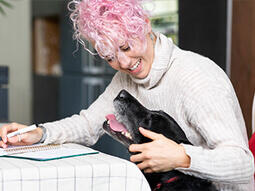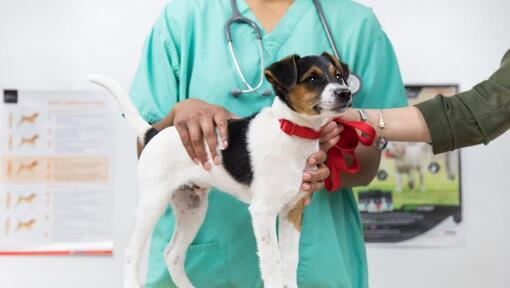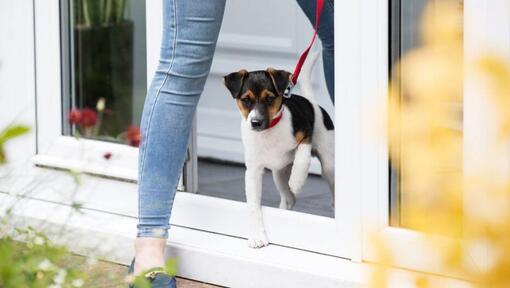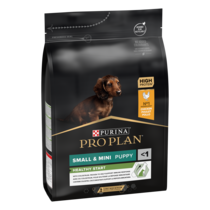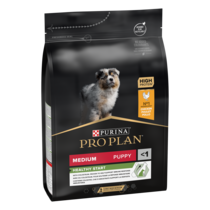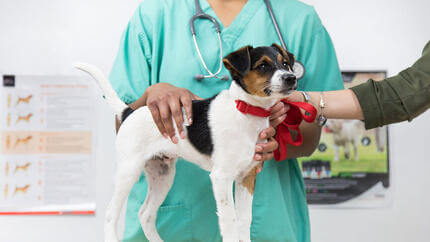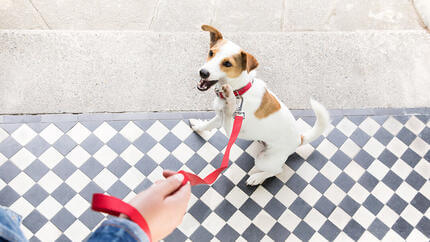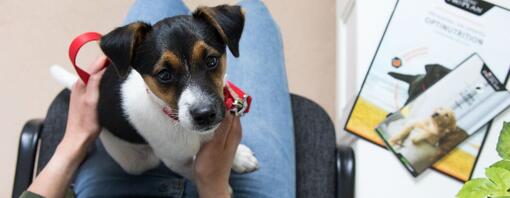

Get ready for your pup's first health check with our useful tips.
Your puppy’s first vet visit
Before you bring your adorable new dog home, you should be planning for your puppy’s first vet visit. Register with a local vet to make sure you’re prepared and when you have your new puppy, arrange an appointment and let them know it's a new puppy health check. Your vet may want to allocate your puppy a bit more time than the usual 10-minute check-up just to make sure everything gets off on the right foot.
What happens during your puppy’s first vet visit
At their first consultation, your pup will have a thorough examination and your vet will discuss puppy vaccinations with you.
Details of any previous treatments, which your breeder or the rescue centre should have supplied, will be useful to bring along.
You’ll have a chat about common problems such as worms and fleas, including how to treat and prevent them, (which again your breeder or the rescue centre should have given you details of), as well as microchipping, neutering, and any questions you have about puppy health care. You might also talk about feeding, exercising and grooming.
During your puppy’s first consultation, the vet will go through a general wellbeing checklist which may include:
- Looking at their skin and coat.
- Weighing them.
- Examining their teeth.
- Listening to their heartbeat through a stethoscope.
- Taking their temperature.
Remember to also ask for details of puppy owner groups and dog-training classes held at the surgery or nearby, as these will help your puppy with training and becoming socialised.
Tips for a smooth first puppy vet trip
- Walk to the vet’s office.
If it’s possible to get to your local vet by walking there, don’t hesitate to leave the car at home. A nice walk will relax your pup and will contribute towards a positive experience.
- Use treats.
Bring your puppy’s favourite treats to every vet visit. Whatever gets their tail wagging, make sure you’ve got it with you and chances are your pup will even develop a spring in their step on their way to the vet.
- Avoid long waiting times.
If possible try to book your puppy’s vet visit first thing in the morning. There will likely be fewer people and dogs sharing the waiting room which will help keep your puppy calmer. Another good tip is to keep the dog outside until you’re about to be called in.
How much does a puppy vet visit cost?
The cost of your puppy’s check-ups will vary depending on your dog’s health and where you live. A young puppy needs a series of vaccinations which will increase the initial costs, so be ready for the first vet bill to reflect that. However, when it comes to the regular puppy check-ups the cost will likely decrease. Unless you puppy needs special medication, most vet trips won’t be significant out-of-pocket affairs.
If your puppy is not already insured, discuss this too, as policies have different advantages and disadvantages – your vet can help you make a decision about what’s best for your puppy. We answered the most frequent questions about puppy insurance in an in-depth article.
Puppy health checklist
Microchipping is important and the microchip is implanted with a simple injection, requiring no anaesthetic. It will give you peace of mind that if your dog does ever get lost, they can be safely returned to you by whoever finds them.
It is the responsibility of breeders to ensure all puppies are microchipped before they are sold or given to their new owner. Make sure you double check with the breeder/rescue centre that they have microchipped your puppy and that the new details match yours to prevent any problems further down the line.
Find out more with our guide to microchipping your dog.
Your vet should send you a reminder when your dog’s vaccinations are due or provide you with a puppy vaccination schedule to help you keep up-to-date. The timing will depend on which vaccination is needed but could include prevention for distemper, leptospirosis, adenovirus, parvovirus as well as parainfluenza and Bordetella (kennel cough). If you’re planning to take your dog abroad, you will also need them to have a rabies vaccination as part of the ‘Pet Passport’ scheme.
Another situation where proactivity pays off is in the control of dog parasites such as fleas, ticks and worms. Remember that fleas, or at least their larvae, can live year-round in your home and garden and ticks can transmit nasty diseases. On your puppy’s first consultation, the vet can advise you on flea and tick prevention as well as how to treat your puppy for tapeworm, roundworm and, if necessary, lungworm.
What happens after your puppy’s first vet visit
Ideally, your vet should see your puppy at least once a year, and more frequently at the start or if they have special medical needs.
These regular visits play a huge part in the 'prevention is better than cure' approach, so don't hold off making the appointment just because your dog seems fit and healthy to you. Your vet will check your puppy over, including listening to their heart and lungs, running their hands over their abdomen to check for any unusual signs, checking for problems with their skin, coat, eyes and ears and scanning their microchip to check it's in working order.
Another advantage of these annual check-ups is to get your dog used to visiting the vet surgery when they’re well. If they only visit when they’re hurt or ill they can become nervous about seeing the vet, associating their trips with bad times or stressful experiences. It’s a good idea to pop into the vet practice every so often, even if you don’t have an appointment. The receptionists and vet nurses will always appreciate a cuddle and it will create a positive memory for your furry friend.
Now that your puppy’s first trip to the vet is finished, continue reading our new puppy owner guides for more useful information on how to look after the new addition to the family.
